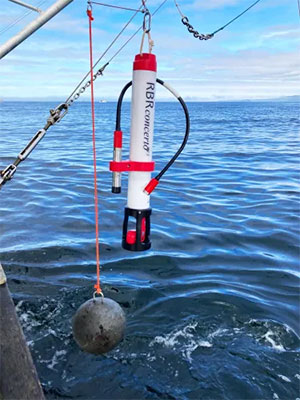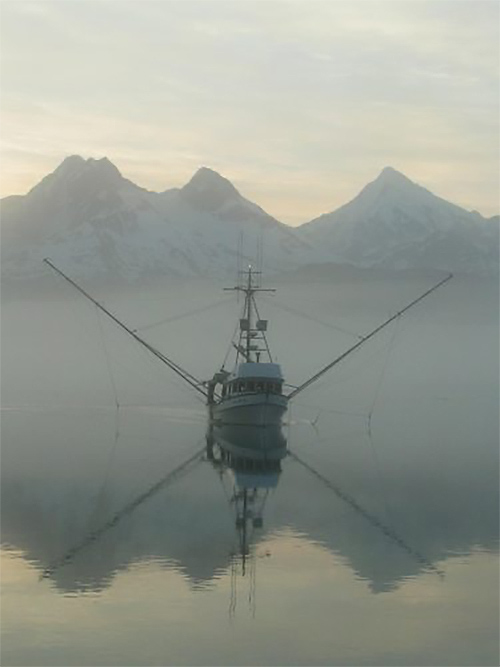CTD (conductivity, temperature, and depth) device being used by trollers to collect data about the physical and biological properties of the water column. |
New partnerships, led by the Alaska Trollers Association (ATA) and facilitated by Alaska Sea Grant, are working to make that happen with two projects. The first project is funded by Alaska Sea Grant and the Alaska Ocean Observing System and directed by UAF College of Fisheries and Ocean Sciences oceanographer Tyler Hennon. The scientists are providing fishermen with instruments to measure the temperature and salinity of the water. The instruments are called CTDs because they measure conductivity, temperature, and depth throughout the water column. Fishermen collect samples year-round at set stations near the fishing grounds and along frequently used transit routes to provide a robust time series of environmental conditions.
The second is a pilot project, with funding provided by the National Fish and Wildlife Foundation, to resurrect and update a logbook program that was active from 1976–1991. Fishermen will collect a wide range of physical and biological information on the marine ecosystem. The logbooks are electronic and can provide managers and researchers real time access to data.
The logbooks are designed by Realtime Data Holdings, an Australian-based company that designs tablet-based logbooks for commercial fishermen. Project partner Ocean Data Network will coordinate the storage and distribution of data to researchers and managers, ensuring confidentiality for participating fishermen. After collection mechanisms are designed this winter, 10 trollers will pilot the logbook system, beginning in May 2023 and continuing at least through summer 2024.
Researchers, including Hennon, and others from the Alaska Department of Fish and Game, National Oceanographic and Atmospheric Administration, U.S. Geological Survey, Alaska Ocean Observing System, and Sitka Sound Science Center will use these data to address questions ranging from abundance and distribution of king salmon forage fish, to oceanographic conditions in the understudied inside waters of Southeast Alaska.
Troller fishing boat. |
Fishermen will benefit from both projects with increased understanding of the waters where they fish, improved management of their target species, annual summaries of aggregate data provided by researchers and ATA, and the ability to collect, store and organize their own catch data.
ATA board member Jim Moore believes the benefits of the projects will extend beyond the improved understanding provided by the data collected. “We expect the fruit of the collaborative nature of this endeavor may be the most significant and positive outcome of our project,” he writes in the project overview.
“I feel very privileged to be part of projects like these,” says Alaska Sea Grant’s Sunny Rice. “They are driven by fishermen not only for their own benefit, but also for the greater understanding of the ocean they depend upon. I think this type of collaboration is exactly what Alaska Sea Grant is meant to help facilitate.”
This article is provided as a public service by Alaska Sea Grant. Alaska Sea Grant is one of 34 Sea Grant programs nationwide. It is a statewide program headquartered at the University of Alaska Fairbanks. Sea Grant has been serving Alaska for over 50 years. |
Representations of fact and opinions in comments posted are solely those of the individual posters and do not represent the opinions of Sitnews.
Send a letter to the editor@sitnews.us
SitNews ©2023
Stories In The News
Ketchikan, Alaska
Articles & photographs that appear in SitNews are considered protected by copyright and may not be reprinted without written permission from and payment of any required fees to the proper freelance writers and subscription services.
E-mail your news & photos to editor@sitnews.us
Photographers choosing to submit photographs for publication to SitNews are in doing so granting their permission for publication and for archiving. SitNews does not sell photographs. All requests for purchasing a photograph will be emailed to the photographer.


